
Nakba Survivor Forced to Flee Jabaliya, Her Home of 82 Years
“My hometown is just a pile of debris”
Zakiah Dawood lived in Jabaliya for over 80 years. She was born on January 1, 1942, in a mud-brick home in what was then a small village tucked into a stretch of fertile farmland, lush with mint and potato crops and surrounded by clucking chickens and ducks. She was six years old in 1948 during the Nakba, when Zionist militias ethnically cleansed 750,000 Palestinians from their homes during the founding of the state of Israel. The swathe of land later known as the Gaza Strip became home to the largest number of Palestinian refugees within historic Palestine, with several United Nations refugee camps being formed throughout the territory, including in Jabaliya. While Zakiah and her family were temporarily displaced in 1948, they were able to return to Jabaliya.
Zakiah stayed in Jabaliya through 1967, when Israel invaded and occupied the Gaza Strip and began building illegal settlements. She stayed through 2005, when the settlements were dismantled, and then through the years of brutal siege first imposed on Gaza in 2007. She stayed through Israel’s vicious assaults on Gaza in 2008 and 2009, 2012, 2014, and 2021. She even stayed in Jabaliya through a year of genocide.
But when the Israeli military launched a concentrated campaign of extermination and ethnic cleansing in northern Gaza earlier this month, Zakiah was finally forced to flee after eight decades, not knowing if she would ever be able to return to Jabaliya.
“I’ve never seen a genocide like this. It was never like it is today. It’s worse than the Nakba,” Zakiah told Drop Site News in an interview in her son’s tent in Deir al-Balah. “During the Nakba, homes were not razed to the ground. Entire families were not wiped out. People were not dismembered. Full neighborhoods were not reduced to rubble, and food and water weren’t entirely cut off,” she said. “Now, Gaza is no longer Gaza. My hometown is just a pile of debris. There’s nothing called Jabaliya anymore.”
At 82 years old, Zakiah has three brothers and five sisters. Two of her sisters passed away. She also has four sons, five daughters, and some 60 grandchildren. As a child, Zakiah played hide and seek and “hajla,” a game involving hopping on one leg. She attended school in a tent that had stones for seats and a block of wood for a chalkboard. But she was forced to stop in the fourth grade, when Zionist militias and the Israeli army began attacking Palestinian towns and villages in 1948.
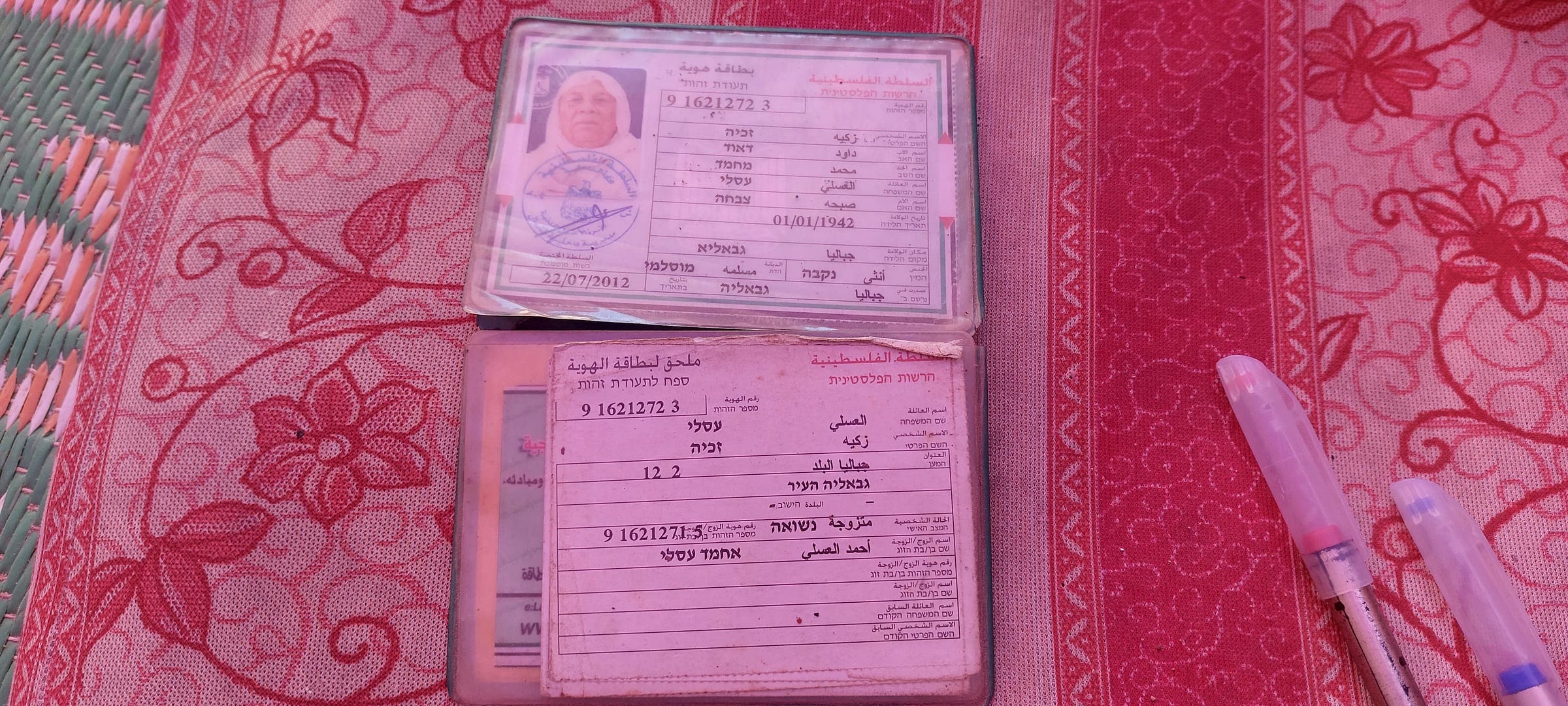
“When we heard of the fierce attacks and slaughter of our people at that time, we panicked and expected our turn to come soon. A few tanks came and encircled our camp. Israeli soldiers stormed our houses and detained many of our men. Consequently, we had to pack our belongings and flee our homes to West Gaza,” she says.
They were eventually able to return to their home in Jabaliya. “We saw thousands of families carrying their belongings heading towards us. We turned our lands into makeshift tented camps for them until they could find homes. We hosted them and shared our homes, plates, and lives together. Later, things settled down somewhat and they managed to relocate to different areas of the strip, either in the Jabaliya camp or elsewhere.”
Over the years and decades that followed, and even after the 1967 Israeli occupation of the Gaza Strip, Palestinians in Gaza were still able to travel with relative freedom throughout historic Palestine.
“I used to travel by bus through the stunning Palestinian lands, from al-Khalil and Haifa to Jerusalem, where I would purchase dates, local oil, dried figs, and grapes. I would spend the entire day outside, touring archaeological sites like the tomb of Abraham and performing all the prayers at Al-Aqsa Mosque until sunset,” she recalled. “My husband used to buy fresh seafood from the sea, such as sardines and crabs, and bring me a variety of fruits and vegetables, including mangoes and zucchini, in addition to fresh meat from nearby butcher shops. From Palestinian salad to stuffed grape leaves and cabbage, we used to prepare every meal.”
That ended in 2007, when Israel began restricting travel out of Gaza and imposing a crippling blockade on the territory, turning it into what has often been described as the world’s largest open-air prison.
But nothing compared to last October, when Israel launched its unprecedented genocidal assault. In December, Zakiah’s daughter and all her children were killed in an Israeli airstrike on their home in Jabaliya. Israel also cut off humanitarian aid, leading to widespread hunger and famine. “I weighed 93 kg before the war. Now, I’m around 60,” she said. “Throughout the past 12 months, I have mainly eaten animal feed and some canned food. Even water was not available. I have respiratory diseases like asthma. Israel’s nonstop attacks have worsened my health and inflicted sheer horror upon me. I tremble with panic all the time.”
When Israel launched its ethnic cleansing campaign in the north earlier this month, Zakiah moved to another part of Jabaliya to stay with her daughters. As the bombardment and ground offensive raged on, she was forcibly displaced several times, moving between the Al-Saftawi and Al-Nasr neighborhoods west of Jabaliya.
“Every shelter I evacuated to during that time was directly shelled. Bombs and rockets were being rained down upon our heads. I couldn’t sleep at all during these days. I saw death numerous times before my eyes. For five days, all we ate was crushed animal seeds and a few rotten cans of food. We were struggling for some contaminated water, which we were filtering through a piece of fabric,” she said. “Then, I was lost in the streets and didn’t know where to go. I was running away and stumbling all the way under incessant warplanes and drones hovering and buzzing overhead. Hundreds of decaying bodies littered the streets.”
Finally, on October 11, she was forced to flee to the south, leaving much of her family behind. Her trek to the Gaza Valley bridge, a stretch of land now dotted with Israeli military bases and checkpoints that divides northern and southern Gaza, dubbed the Netzarim corridor, was beyond harrowing.
She walked from early morning until dusk until she arrived at the Netzarim corridor. “On my way, I lost my phone and fell down many times. Some of my teeth were broken as a result,” she said. “I really thought about throwing myself into the sea many times so I wouldn’t have to face the Israeli army or suffer anymore.”
When she arrived, Israeli soldiers forced her to raise her hands and turn around before interrogating her. “They surrounded me with military dogs. I was shivering with panic and started crying and imploring the soldiers to protect me and take me to my sons in the south. They refused, but then a UN car heading to the south took me. They gave me some water, kissed my forehead, and calmed me down,” she said. “I luckily had a tiny piece of paper with my sons’ phone numbers. They called and told my sons that I was with them. My sons didn’t believe it and broke into tears once they heard my breaking voice. I stuttered a bit and ended the call. Then, they sent me to Deir al-Balah in a Red Crescent vehicle. I arrived at my son’s tent at night. I wasn’t able to stand on my feet. I’ve never gone through something like this in my entire life.”
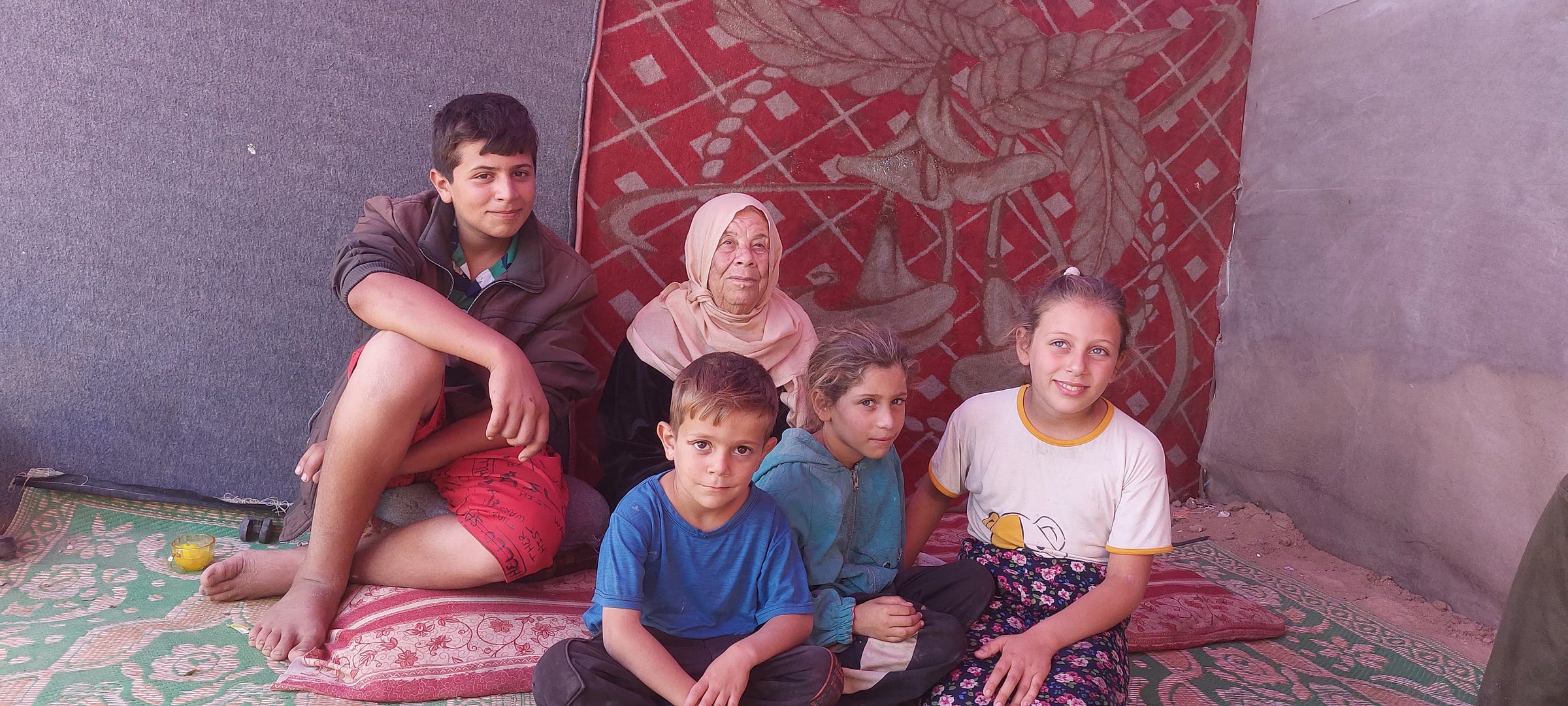
Zakiah is now suffering from an “incompetent memory,” post-traumatic stress disorder and a severe case of osteoarthritis, a degenerative joint disease, Elham, her 30-year-old granddaughter, told Drop Site News.
“When she first arrived, she was extremely fatigued and sick. She couldn’t stand on her feet and was so hungry,” Elham said. “Then, at night, she suddenly started crying. She said she couldn’t forget the decomposing bodies and the terrifying sounds of explosions. We now give her three painkiller pills a day and stay close to her all the time, so she can rest and sleep. Whenever the horrific images she observed come across her mind, she starts sobbing in pain. We honestly don’t know how to care for her as we can’t find enough medication.”
Like tens of thousands of others over the past three weeks, Zakiah has been forcibly displaced from northern Gaza to the south, to Deir al-Balah, joining over a million displaced Palestinians crowded into tents on every street in an area that has not been spared by Israel’s bombardment.
“Everything has simply faded away,” Zakiah said. “The Israeli army bulldozed our lands, set our homes ablaze, and destroyed our neighborhoods. It’s probably better here in Deir al-Balah, but I am without mattresses or blankets. I am still trembling with cold and fear as I still hear the buzzing and bombing sounds. One year without meat or salad. I can barely have some bread,” she said, choking up.
“This life is utterly unbearable. I don’t have the energy to endure it anymore. I hope this war ends and I’ll be back home, even to the rubble of my home,” she said. “I miss making three meals a day. I miss calm and peace. I hope we’ll restore the beautiful times, and this occupation will end. I dream of seeing and living in a free Palestine before I die.”


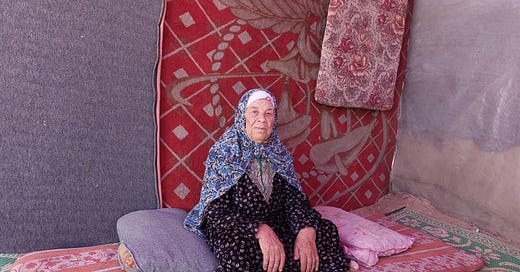








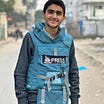
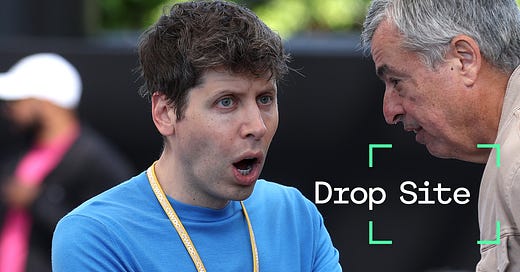

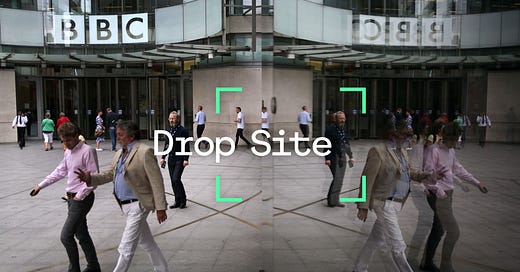



May God protect the people of Gaza. Its an irony the dollar that says "in God we trust" is the one funding atrocities against these children of God. Shame.
Thank you Abubaker Abed for this powerful work of journalism presenting the human side of this ongoing tragedy.
Dear Grandma Zakiah, I am sorry for the failure of myself and my country to protect you and your family, to stand up for you, or even just to care about you.